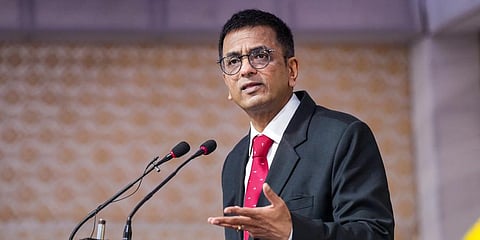

NEW DELHI: It is wrong to say that the Supreme Court Collegium has no factual data to evaluate judges it considers for appointments, said Chief Justice of India DY Chandrachud on Friday.
To ensure transparency in recommending judges to the Supreme Court, the collegium has prepared a broad platform, with the aid of which it has assessed the top 50 judges for consideration as SC judges, he said.
Speaking at the Ram Jethmalani Memorial Lecture, Chandrachud said that the SC Collegium’s aim is to lay down objective parameters for the selection of judges for the Supreme Court and high courts.
“One of the criticisms against the collegium is that we have no factual data to evaluate the people we are considering for appointments. We have taken some steps. It is a work in progress, but we are improving. With the help of the Centre of Research and Planning, we have prepared a broad platform, where we have assessed the top 50 judges in the country, who would be considered for appointment to the SC,” CJI Chandrachud said.
“We have data on judgements, reportable judgements, data on the quality of their judgements. The idea is to make the recommendations more transparent. Not by sharing our discussions in the public realm, which we obviously cannot do, but by laying down objective parameters for selection to the Supreme Court and high courts,” added the CJI.
Referring to the Supreme Court being on board with the National Judicial Data Grid (NJDG), he said that NJGD would provide real-time tracking of disposal and pendency of cases. “This will increase inter-court coordination of data and aid in quality research. Disposal and pendency of Supreme Court cases are available case-wise, year-wise, stage-wise and quorum-wise. This information will help us identify the areas of concern to decrease pendency,” the CJI said.
“Institutionalisation requires policy solutions. Due to a lack of data, it had been painfully difficult to devise methods to reduce pendency. Now, as per NJDG data, there are 62,946 civil and 17,555 criminal cases pending. We have had a disposal rate of 95.34 per cent this year. This data will help me prioritise certain categories of matters for their able disposal and allow us to evaluate our performance,” he added.